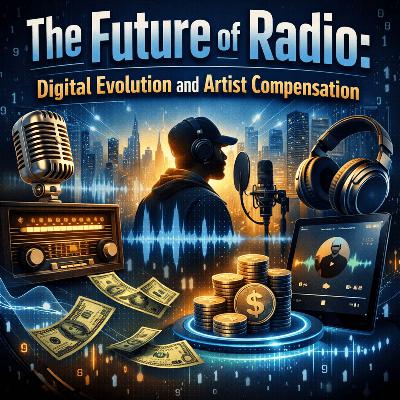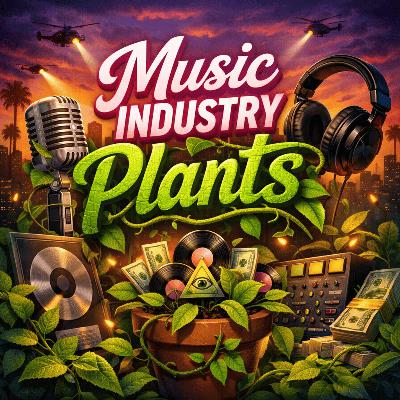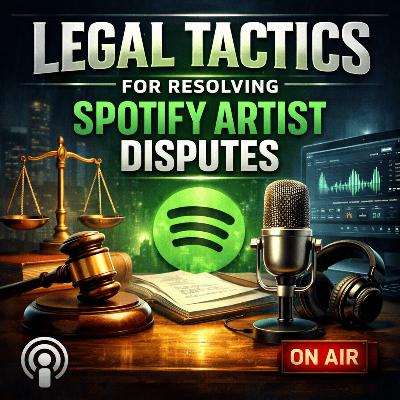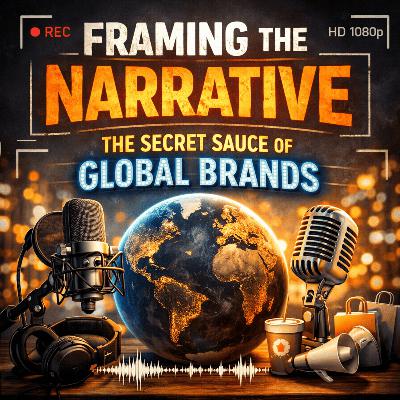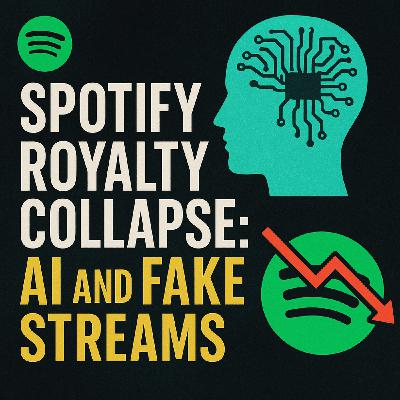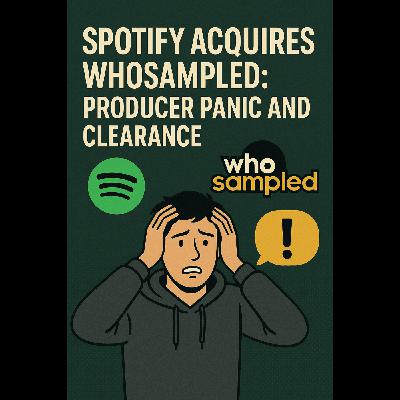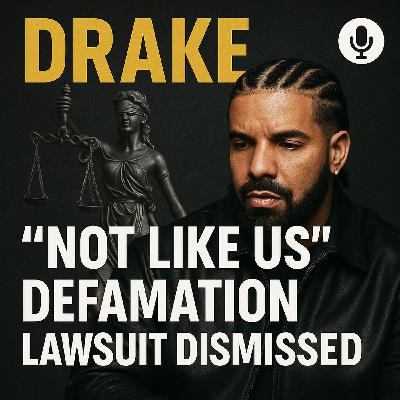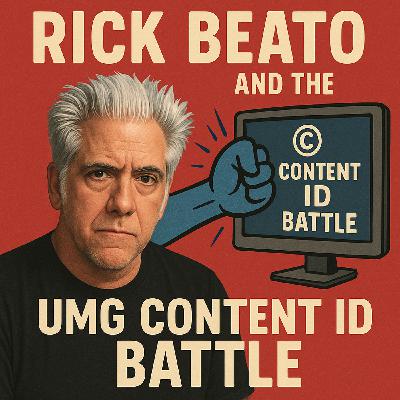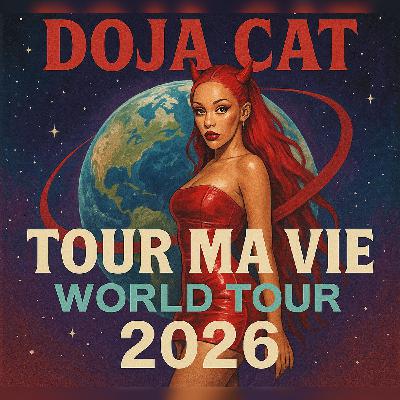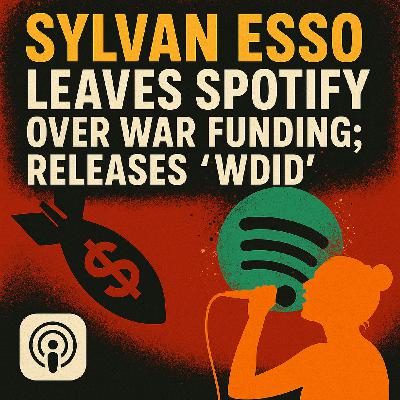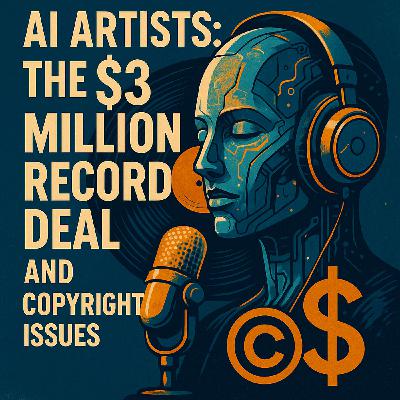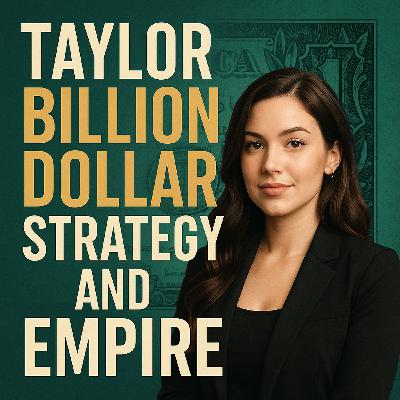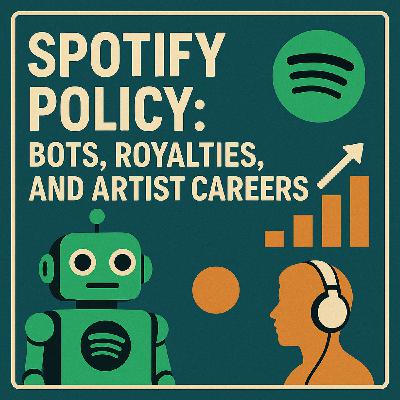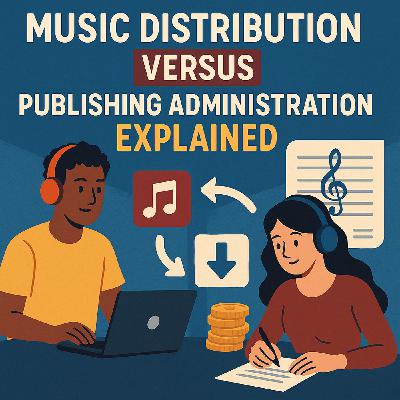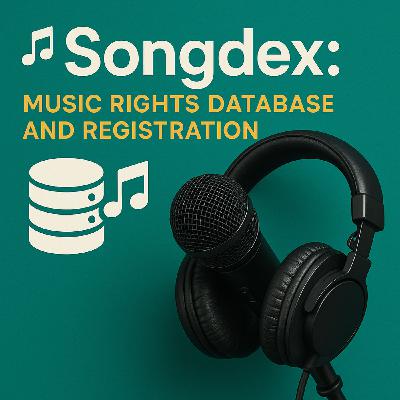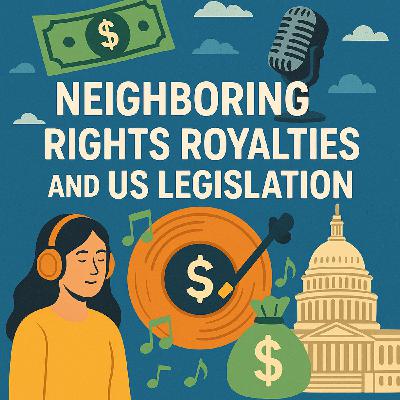Discover Music & Royalties Explained
Music & Royalties Explained

Music & Royalties Explained
Author: Music & Royalties Explained
Subscribed: 48Played: 30Subscribe
Share
© Music & Royalties Explained
Description
We Teach the music Business So Artist and Producers Secure their royalties In-Full💵💰 from their Music, One of the Biggest Question asked within the music industry is how to get paid music royalties after your hard work of Writing, Composing, Recording etc. because of this reason I’ve decided to share my knowledge independent artist and producers etc who would like to becoming successful in their music journey. Im successfully earning music royalties from multiple sources including Soundcloud, Spotify, Napster, Deezer, AudioMack, from Publishing, Earning from Performance & Mechanical Royalties etc. Now it’s your turn, I created this as a guide to help you on your success on how to collect your royalties and promoting your music so you will earn from it, you’ll also have a basic understanding about what percentages are fair so that you get paid what you are worth.
music business, music royalties, mechanical royalties, performance royalties, ASCAP, BMI, songwriter tips, indie music, artist income, streaming platforms, music publishing, songtrust, harry fox, music distribution, get paid for your music, royalty rates, CD printing, how to monetize music, music education podcast, lofi artist royalties, Spotify revenue, music copyright, indie artists, music marketing, how to collect royalties
music business, music royalties, mechanical royalties, performance royalties, ASCAP, BMI, songwriter tips, indie music, artist income, streaming platforms, music publishing, songtrust, harry fox, music distribution, get paid for your music, royalty rates, CD printing, how to monetize music, music education podcast, lofi artist royalties, Spotify revenue, music copyright, indie artists, music marketing, how to collect royalties
51 Episodes
Reverse
In this Billboard podcast interview, Charlie Puth joins host Kristen Robinson to explore the musical theory and business behind holiday hits. Puth identifies specific chromatic chord progressions, jazz-influenced melodies, and the use of sleigh bells as the essential elements that define the "Christmas sound." The discussion highlights how the streaming era has turned holiday music into a massive annual industry, allowing older classics to dominate the charts every December. Puth also shares his personal affinity for R&B Christmas tracks and details the rapid, hour-long writing process behind his own festive single. Beyond seasonal music, he reflects on his upcoming album, which emphasizes human vulnerability and organic production over AI-generated perfection. The conversation concludes with a look at the evolving music industry, focusing on the shift from professional pitch-writing to artists crafting cohesive, personal bodies of work.
This Billboard podcast episode examines the lucrative holiday music industry, a unique market where seasonal tracks generate over $177 million annually in the United States. Music executives Guy Moot and Kerianne Marshall explain that while creating a new "evergreen" hit is exceptionally difficult, the financial rewards are immense due to consistent royalty payments and high streaming concentration among top classics. The discussion highlights how digital platforms and sync licensing in films and advertisements keep decades-old songs culturally relevant and profitable. The guests also note that successful holiday hits often focus on universal themes of nostalgia and atmosphere rather than strictly religious content. Additionally, the episode explores the global differences in holiday music trends, such as specific regional favorites in the United Kingdom compared to the United States. Ultimately, the sources portray the Christmas genre as a dependable economic powerhouse for songwriters and publishers despite its brief annual window of popularity.
This transcript from a Billboard podcast examines the enduring relevance and shifting landscape of the radio industry. Featured guest Michael Huppy, CEO of Sound Exchange, explains how terrestrial radio remains a massive business despite significant competition from streaming services and social media. The conversation highlights a controversial US policy where recording artists receive no royalties from AM/FM broadcasts, unlike the songwriters who created the music. Additionally, the sources address the rise of digital radio, the impact of corporate consolidation, and the emerging challenges posed by artificial intelligence in broadcasting. Future legislative efforts like the American Music Fairness Act are also discussed as potential solutions to modernise performer compensation.
The provided text explores the nuanced phenomenon of the industry plant, categorizing artists into five distinct levels of commercial backing and artificial development. It highlights how organic plants like Billie Eilish maintain indie credibility despite deep-seated family connections, while obvious plants such as Ice Spice benefit from aggressive, high-level corporate pushes. The transcript also examines puppets who undergo drastic image shifts to suit market demands and nepo babies whose inherent privilege ensures success regardless of failure. At the most extreme level, super plants like Britney Spears or K-pop groups are described as highly controlled entities managed by labels from a young age. Ultimately, the source argues that modern musical stardom is often a manufactured product of access and strategic investment rather than purely spontaneous talent.
This guide outlines strategic methods for independent musicians to resolve common Spotify disputes, such as profile hijacking, streaming fraud allegations, and unauthorized uploads. The author emphasizes the importance of meticulous documentation, suggesting that artists maintain a centralized record of ISRC codes, URLs, and incident summaries to ensure consistent communication with support teams. For identity issues, creators are encouraged to file trademark infringement reports and pursue federal registration to strengthen their legal standing. When facing copyright violations, the text advises sending formal DMCA notices to both Spotify’s legal department and the infringer’s music distributor. Additionally, the source recommends a "spider effect" strategy, which involves simultaneously contacting distributors and platforms to increase the likelihood of a swift resolution. Ultimately, these professional tactics empower artists to protect their intellectual property and digital presence without always needing expensive legal representation.
This transcript features creative agency owner Chris Alba discussing framing, a psychological storytelling technique used by elite artists and brands to dictate how audiences perceive their work. He argues that the packaging and presentation of a creative project are just as vital as the quality of the content itself. By "setting the room," creators can use context, scarcity, and visual identity to increase their perceived value and foster deep emotional connections with fans. Alba illustrates these concepts through diverse examples, ranging from Hollywood cinematography and luxury fashion to viral marketing stunts and music industry strategies. Ultimately, the source serves as a guide for artists to move beyond "shotgun blasting" content by adopting a cohesive brand narrative that triggers specific subconscious reactions.
The source, a transcript from the YouTube channel "Top Music Attorney," expresses conviction that Spotify's music royalty system is on the verge of collapse due to two primary issues. The first major concern is the proliferation of fraudulent streaming activities, specifically citing a class action lawsuit against Spotify that alleges the platform is knowingly allowing fake streams, including billions linked to Drake, which ultimately dilutes the royalty pool for independent artists. The second critical problem is the overwhelming influx of AI-generated music, with a competitor reporting 50,000 fully AI songs uploaded daily, suggesting human creators will be flooded out, especially since a survey found 97% of listeners couldn't distinguish between human and AI music. The attorney suggests that independent artists should adopt a "sell before you stream" method and treat platforms like Spotify as mere advertising rather than a reliable source of income. Ultimately, the discussion underscores that the current practices are not only harming creators but are also defrauding advertisers and shareholders, making the overall system unsustainable.
The provided sources, primarily a YouTube video transcript from "Top Music Attorney," discuss the widespread anxiety among music producers following Spotify's acquisition of the sample database WhoSampled. Producers are concerned that this acquisition will give major record labels a significantly easier tool to identify and sue artists for unauthorized sample usage, effectively creating a "database of crimes." The discussion highlights that while Spotify plans to use WhoSampled to power new features like "song DNA" and expand song credits for users, the legal repercussions for underground and even successful artists who often struggle with the complex and expensive process of sample clearance are paramount. The video emphasizes that this move is seen as another example of music industry consolidation that prioritizes corporate profit over the creative community that built the database, urging caution and offering guidance on proper sample licensing procedures.
The source text is a transcript from the "Top Music Attorney" YouTube channel, where the host discusses a controversy surrounding the AI music company OpenBeats.Ai, which allegedly misrepresented its training methods. The video analyzes a report by Weaver Beats claiming that OpenBeats.Ai was fraudulently advertising its AI as "ethically trained" while actually using the technology and data set of a different company, Suno, potentially without proper licensing or disclosure. The discussion also covers the legal implications of these actions, including potential trademark issues and the importance of FTC disclosure guidelines for content creators who promoted the company, highlighting the financial repercussions for failing to disclose paid endorsements. Finally, the source mentions OpenBeats.Ai's subsequent retracted apology and statement admitting to using third-party APIs and pledging to update their terms.
The source, an excerpt from a YouTube video titled "Why Sora 2 Is TERRIFYING," addresses the significant copyright and intellectual property concerns surrounding the new Sora 2 AI video generator. The speaker highlights what they believe is blatant copyright infringement, citing examples of the AI creating content featuring well-known copyrighted characters such as Pikachu, Rick and Morty, and Spongebob. A major point of discussion is OpenAI's reported, and possibly retracted, attempt to implement an opt-out policy for copyright holders, which critics compare to excusing theft. The speaker concludes that AI companies appear to be operating with a "ask for forgiveness, not permission" mentality, prioritizing massive profits over the rights of human creators, despite ongoing legal challenges.
The source provides an overview of the dismissal of Drake's lawsuit against Universal Music, which stemmed from the song "Not Like Us" by Kendrick Lamar. This legal analysis, presented by a "Top Music Attorney" on YouTube, explains that the entire lawsuit was dismissed, including claims for defamation, secondary harassment, and streaming fraud. The court largely based its decision on the First Amendment protection of opinion and freedom of expression, arguing that the lyrics and surrounding context—specifically the nature of a rap battle diss track—are perceived as hyperbole and exaggeration rather than statements of fact. Furthermore, the court dismissed the secondary harassment claim because it was a criminal statute with no private right of action, and the streaming fraud claim failed because Drake was not a consumer and provided insufficient evidence.
The source material discusses the ongoing YouTube copyright dispute between creator Rick Beato and Universal Music Group (UMG), focusing on the alleged weaponisation of Content ID claims by major record labels to seize video monetisation from creators. A "Top Music Attorney" video transcript details how Beato is receiving numerous, often repeated, claims on his educational videos, despite previously winning a fair use dispute on a specific track, demonstrating how UMG is allegedly ignoring YouTube's claim resolution policies. The attorney explains the four factors of fair use in copyright law, empowering creators to understand and file counter-notifications, arguing that these labels are employing bully tactics to force creators to surrender revenue rather than risk escalating to the severe Stage 2 counter-notification process. Beato himself confirms he is fighting these claims to raise awareness for smaller creators, noting that while he is frustrated, he is relying on others to file potential lawsuits.
The source is an article from the New York Post detailing the announcement of Doja Cat's 2026 ‘Tour Ma Vie World Tour’ following the release of her fifth studio album, "Vie." The piece confirms the artist's return to touring despite a previous announcement of retirement and includes positive critical reactions to the new, synth-heavy album. Furthermore, the article provides a complete list of tour dates spanning from May to December 2026, information on where fans can purchase tickets, and a set list from a previous concert in the summer of 2025. It also highlights other contemporary Hip-Hop artists who are touring during the same period.
The source details the musical duo Sylvan Esso's decision to remove their entire catalog from the streaming platform Spotify while simultaneously releasing a new self-released single titled “WDID.” This move is explained by the duo, consisting of Amelia Meath and Nick Sanborn, who stated they cannot continue to put their music on a platform that "directly funds war machines" due to its founder Daniel Ek’s investment in a weapons contractor. Sylvan Esso is the latest in a series of artists, including Deerhoof and Godspeed You! Black Emperor, to pull their music from Spotify in protest of Ek's venture capital firm Prima Materia's investments in the defense sector. The duo released the new track independently through their own label, Psychic Hotline, marking a decisive shift away from the streaming giant.
The source provides a transcript from a YouTube video by a top music attorney discussing the recent signing of the AI artist Monae to Hallwood Media in a deal reportedly worth up to $3 million. This is noted as the second AI artist signed by this label, following "I'm Oliver," and the video explores the implications of record labels monetizing AI music while major labels are simultaneously suing the AI generator Suno. The attorney also addresses the controversy and pushback from human artists, such as Khani, who feel that AI music devalues their work, and further explains the complex legal issues surrounding copyright and the collection of publishing royalties for AI-generated works, noting that performance rights organizations like BMI and ASCAP currently do not accept fully AI-generated music. Finally, the source touches on the commercial success of Monae's music, which has millions of streams, and raises questions about whether audiences are connecting with the human-created lyrics behind the AI avatar.
The YouTube transcript provides an overview of Taylor Swift's career trajectory and how she transitioned from a determined young artist to a billionaire mogul. It explains that her success is rooted in strategic decision-making, emphasizing her skills as a master storyteller who cultivated a deep connection with her fanbase, known as "Swifties." The text details her evolution from country music to pop, the intense public feuds and backlash she faced, and the pivotal moment when she lost the masters to her early albums, which led to her groundbreaking re-recording strategy ("Taylor's Versions"). Ultimately, the source frames Swift's empire as being built on owning her value, creating the repeatable system of "eras," and bypassing traditional industry power structures to control her intellectual property and maximize profits, notably through the record-breaking Eras Tour.
Spotify's $10 Billion Lie: Unpacking Royalties, AI Bots, and the True Cost of a Stream
The provided text is an excerpt from a YouTube video transcript of an interview between the host of the Indie Music Academy channel and Sam, Spotify's Head of Marketing and Policy for Spotify for Artists. The discussion focuses on several critical issues facing independent musicians, including monetisation, royalty payments, and the complexities of the streaming economy. Sam addresses common misconceptions, such as the fixed per-stream rate, explaining that Spotify's model prioritises growing the total royalty pool through user engagement, even if the per-stream calculation is lower than competitors. Furthermore, the conversation explores the company’s efforts to combat artificial streaming (bots) and details Spotify's policy approach to AI-generated music, particularly concerning impersonation and mass uploads.
The source, a transcript from a YouTube video, outlines the key differences between music distribution and music publishing administration. Music distributors are responsible for placing music in retail stores and digital platforms like Spotify, collecting payments from sales or streams of the sound recording (the master), and then paying the artist or label after taking a fee. Conversely, music publishing administrators manage the rights of songwriters by registering songs with performing rights and mechanical rights organizations, handling licensing, and collecting the publishing royalties for the composition, though they do not own any rights to the songs. The video also details various companies that offer these services, such as CD Baby and Tunecore, and provides advice on the necessity of registering songs with the Library of Congress and signing with a performing rights organization (PRO) even when using an administrator.
The provided transcript excerpt from a YouTube video offers a detailed explanation of Songdex, which is described as the largest database for music rights and related business information, launched in 2016 by Music Reports. Publishers and songwriters are the primary audience, as Songdex allows them to search for and claim unmatched tracks, register new musical works, and review existing titles within the database. The video outlines the process for creating an account, searching the database using filters such as title, writer, or performer, and the options available within the account, including manual or bulk registration. It is noted that while Songdex facilitates these actions, a separate Music Reports account is required to receive royalties, and users are warned against creating duplicate entries by registering songs in both Songdex and Music Reports.
The source, an excerpt from a YouTube video transcript, explains that neighboring rights royalties are public performance royalties owed to artists and master rights owners when a sound recording is broadcast or publicly played. The video highlights that the United States does not pay these royalties for domestic performances, stemming from its failure to attend and sign the Rome Convention in 1961, which in turn causes other countries to often withhold payment from US artists. However, the source notes that SoundExchange does collect non-interactive digital streaming royalties and can collect some international neighboring rights through reciprocal agreements, and services like Royalty Claim can help artists recoup unclaimed international funds. Finally, the speaker encourages artists to support legislation, such as the proposed AM/FM Act, aimed at securing these royalties for US terrestrial radio play.




